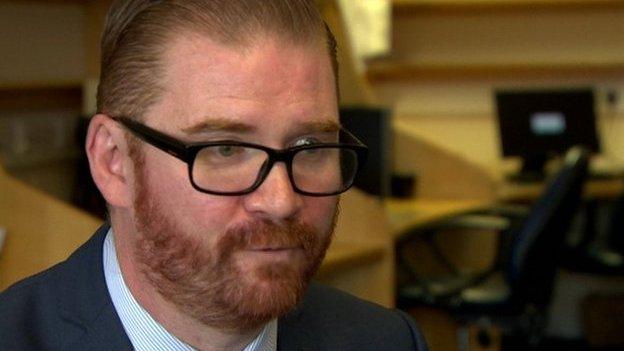Northern Ireland health officials 'lack leadership and vision', senior doctor says
- Published
Dr George O'Neill said no-one appeared to be in charge of the health service
A senior doctor has accused Northern Ireland health officials of failing to provide leadership, vision or strategy.
Dr George O'Neill is a GP and former adviser to senior health officials.
He said a lack of leadership meant the system runs the risk of remaining not fit for purpose.
Health Minister Simon Hamilton said he agreed the health care system "needs major reform" but that there had not been many suggestions about what could be done.
Speaking ahead of the BBC's NHS weekend, which is examining how health services are being delivered across the UK, Dr O'Neill said no-one was "leading the charge" in Northern Ireland.
"The current system is not fit for purpose. Here we don't appear to have anyone in charge," he said.
"The Liam Donaldson report pointed that out. He asked 'who is in charge?' We just don't have that at present.
"Hopefully this will emerge once the present review of health and social care is complete - there will be a clearer picture of where it is going. But unless we have the leadership to deliver it, it will end up on the shelf like all the other reports."
At present, there is an internal review of the current administration structure including the Health and Social Care Board and the Public Health Agency. It is examining if there is duplication of work and staff.
Speaking to the BBC, Dr O'Neill, who has practices in north and west Belfast and who received a special recognition award in 2014 for his contribution to health care, said he was hopeful a shake-up would produce someone who would take a lead in the transformation of the system.
The BBC understands that the Health and Social Board as it currently exists may be under threat with the possibility of a new streamlined structure introduced.

Health Minister Simon Hamilton said he agreed the health care system "needs major reform"
Dr O'Neill said: "Unless there is radical transformation of how we deliver health and social care and that will require how GPs operate, hospitals and care in the community we will end up with real significant problems.
"We are unique, in that Northern Ireland has far too many hospitals. We have 10 acute hospitals, we need perhaps four. But we need someone who is prepared to make that decision, to lead the change.
He said it is well documented that the system is not fit for purpose and he warned that those in charge cannot continue to ignore the recommendations set out in the Donaldson health review.
"My view is that politicians should not micro-manage health - instead they should have an overview of it.
"They should be involved in policy and strategy, but it is not their job to deliver it. I don't care who leads the charge, but if we don't have someone, we'll be sitting here in 10 years talking about the same thing."
The health minister told the BBC: "I agree with the need for transformation in our health and social care system.
"But there have been a lot of opinions expressed by people about diagnosing the problems, but not a lot of suggestions as to what the exact treatment should be."
Mr Hamilton said he was ruling out a recommendation that control of major decisions pertaining to health care in Northern Ireland should be made by a panel of international experts.
"I'm not in public life and in public service to cede control of major decisions around the future of health and social care in Northern Ireland to an international panel of experts that I would accept notes from," he said.
"I think we need independent expert advice, but it also needs local input because local people working in the system will know it well."
The health minister said he intended to put forward his vision for Northern Ireland in the weeks to come.
This weekend, the BBC is taking a national look at the role of GPs and asking if seven-day working across the hospital system is a myth or reality.
The BMA said 46 new GP posts were required in Northern Ireland annually to plug the workforce gap.
- Published27 January 2015

- Published16 July 2015

- Published13 August 2015
- Published8 April 2014
